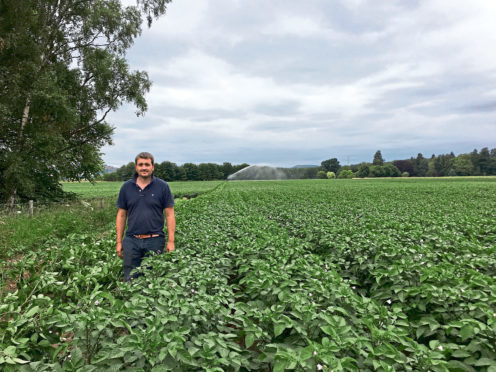Conditions in Scotland’s potato fields are fast approaching those experienced during the infamous drought of 1976, when yields crashed, scarcity created demand and prices rocketed to an unprecedented £300/tonne.
Dr Mark Stalham, a senior research associate at world-leading agronomy institute, NIAB CUF, confirmed this is just the second year in four decades when high temperatures and lack of rainfall for more than a month have placed such strains on the UK’s potato crops.
However he insisted it was unlikely that prices would reach anywhere close to £750/tonne which would be the 2018 equivalent of 1976 prices.
“There will be few crops that ever make that level, and they would be very niche markets such as esoteric salads – and they’d have to be organic as well,” he said.
“But we may see prices reach into the high £300s or £400s per tonne.”
Dr Stalham warned growers attending the AHDB open day at Bruce Farms near Meigle that crops are already being sacrificed because of lack of rainfall as even farmers with irrigators are struggling to get round their fields to get moisture into the soil. Just over 50% of UK growers are geared up to apply water, but in Scotland that figure drops to nearer 30-40%.
He also predicted that the summer of 2018 is just a foretaste of climate change and what the weather will be like in 30 years’ time.
“Evaporation rates here in the last 10-12 days are the equivalent of the middle region of France. Lessons are being learned this year about irrigation and how we need to gear up for climate change,” he said.
“The message isn’t so much about water supply as people still have water they can abstract, rather it’s the ability to apply it and the amount of hours in the day to get round the fields.
“Already we are seeing crops in the south of England which have lost significant numbers of leaves on the lower part of the stem, which can’t be recovered later in the season, so that’s pretty terminal. It’s vital that you keep on applying as much water as you can until it starts to rain.”
However, growers are already experiencing a shortage of pumps and other irrigation equipment, and those with irrigators are already working round the clock.
Kerr Howatson, the potato manager at Bruce Farms, said he was being advised to irrigate potato crops every three days.
“But it takes 11-12 days to irrigate all our fields,” he said. “In an ideal world we’d have another six reels but we only irrigate here twice every five or six years, and this is the longest hot spell for a lot of years. We have irrigated fields three times already and are about to go in for a fourth.”
